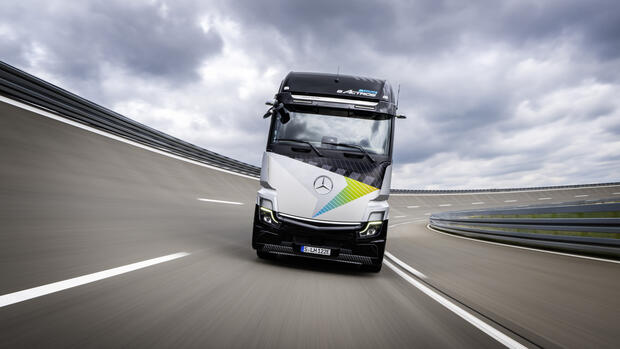Vienna Fully electric trucks in the fleet are currently not an issue for most companies in the forwarding trade. The available electricity trucks are simply too expensive – especially for long-distance transport.
According to the Federal Motor Transport Authority, 53 battery-electric semi-trailer tractors were newly registered in Germany from January to April. In the same period, more than 14,900 new diesel trucks were put on the road.
However, experts from Daimler Truck predict that this relationship could soon change. The world’s largest manufacturer of commercial vehicles with a total weight of more than six tons announced on Tuesday that it would be presenting the eActros 600 electric truck to the public in detail on October 10. The group is already promising that the new eActros will be the group’s “most economical” truck for long routes due to its low energy consumption.
The battery truck would drive up to 500 kilometers without recharging and “can replace the majority of diesel trucks in the important long-distance segment,” says Karin Radström. She is head of the core brand Mercedes-Benz Trucks. “I am convinced that this truck will define the new standard in road transport.”
The market share of battery-electric semi-trailers in Germany is currently less than 0.4 percent. The Actros series is Daimler Truck’s bestseller in Europe. Many in the industry are skeptical that a rapid electric turnaround is possible here.
Internally, the Swabians are talking about a change. Radström and her team fuel their confidence with letters of intent from their major customers. They cannot yet order the eActros 600 – fifty prototypes of the model are currently being tested. But in 2024, the electric truck should be ready for series production and be produced a little later.
DB Schenker has therefore announced that it will buy 100 vehicles from the series for its fleet. The logistics service provider Dachser, the meat processor Tönnies and the transport company Hegelmann Group each want to order 50 more eActros for their long-distance transport fleets.
>> Read here: Daimler Truck expects rapid growth in electric buses
The purchase price of the eActros 600 will be significantly higher than the diesel variant, according to internal sources. However, if you look at the total operating costs of the vehicles over several years – i.e. expenses for fuel and electricity, maintenance, repairs, insurance, toll fees and resale values - the future will be the electric version the Actros at an advantage.
Big goals, sobering reality
However, Radström still has to convince small and medium-sized customers of the product. With the eActros 300 and 400, Daimler Truck has had battery-electric versions of its truck on the market since 2019. But sales are low and the vehicles are usually only profitable for Daimler Truck customers with the help of high subsidies.
In addition, there are no charging stations for trucks in Europe, especially those with a charging capacity of up to a thousand kilowatts, criticizes the Federal Association of Road Haulage, Logistics and Disposal (BGL). “So far, mega-chargers for quick charging on the go have only existed on paper,” says the lobby group for medium-sized freight forwarders.
“I am convinced that this truck will define the new standard in road freight transport,” says the head of the core brand Mercedes-Benz Trucks.
In fact, the power grid around the world needs to be upgraded to accommodate tens of thousands of electric articulated lorries. This is shown by a study by the management consultancy McKinsey. This calculates that around 450 billion dollars will have to be invested in the charging network for electric trucks in Europe, the USA and China in the coming years. If these investments are not made, the ramp-up of e-trucks is likely to be delayed.
At the same time, truck manufacturers and logistics companies are under pressure to electrify their fleets. Heavy goods traffic is responsible for the emission of large amounts of climate-damaging carbon dioxide. The EU Commission wants to tighten the fleet consumption specifications for heavy commercial vehicles in order to reduce the segment’s CO2 emissions by 90 percent by 2040.
That’s how important the eActros 600 is for Daimler Trucks
The sales figures for the Volvo Group, Traton (MAN, Scania) and Daimler Truck groups show how difficult it is to achieve this goal. In relation to the total sales of the groups, some of which exceed 500,000 vehicles, the proportion of electric vehicles is all less than one percent. The Volvo Group sold just 2,200 all-electric trucks, buses and machines last year. At the Volkswagen subsidiary Traton there were 1200 electric vehicles and at Daimler Truck 914 Stromer.
>> Read here: Major merger in Asia: Daimler Truck and Toyota to merge truck business
Daimler Truck in particular has more ambitious goals. By the end of the decade, the Swabians are trying to achieve 60 percent of their sales in Europe, Japan and the USA with vehicles that are either battery-electric or powered by a hydrogen-based fuel cell.
The eActros 600, whose type designation indicates the battery capacity in kilowatt hours, is extremely important for the group because it is intended to replace the diesel truck as the most important product. For the battery cells, Daimler Truck relies on lithium iron phosphate technology (LFP) from the Chinese market leader CATL.
The battery of the model can be charged from 20 to 80 percent within half an hour and withstand a mileage of 1.2 million kilometers in ten years. However, the fleet preparers usually only keep the long-distance trucks for about five years before they buy new ones.
More: Hydrogen car, synthetic fuels or would you prefer an e-car?
